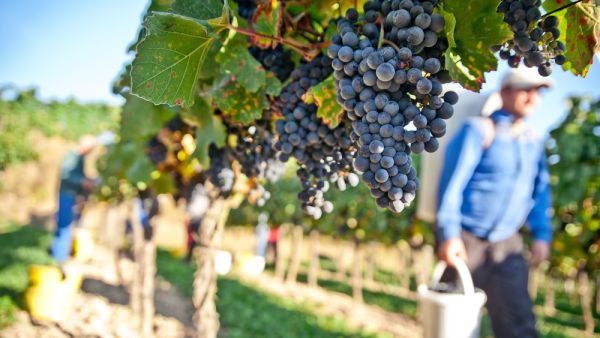The state of Lebanon’s wine industry has previously been assessed to be in dire straits thanks to the current depth of crises facing the country. But for one of Lebanon’s foremost winemakers, Sami Ghosn of Massaya, “wine is beyond politics.”
Despite Ghosn’s verdict, the wine industry, long regarded as the "pride of Lebanon" has found itself tangled up in the events of the last year: a revolution, economic crisis, a global pandemic, followed by the catastrophic Aug. 4 blast in Beirut. All wreaking havoc upon businesses and livelihoods across the country. In danger with falling GDP levels and spiking prices, Lebanese winemakers have been facing declining sales, inflated prices, decreased profit margins and all with little light at the end of the tunnel.
Yet they hold onto hope, for the industry has shown resilience in the past through historic turmoils. Ghosn’s vineyard Massaya, run alongside his brother Ramzi, has wineries in Mount Lebanon and the Bekaa valley, both famed regions for their prime grape growing conditions. Speaking to The Daily Star, Ghosn said he was always aware of the difficulties of running a winery in Lebanon. He mentioned “the roadblocks we are used to in this country,” citing the conflicts of 2006 and 2008 as a horrific time for Lebanon, and the industry.
The country’s Mediterranean climate creates an ideal environment for high-quality vineyards. There are around 46 wineries in Lebanon, with a range of big, medium and small producers. In 2019, they produced around 8.5 million bottles of wine, according to a report on the subject by Blominvest Bank. Half of these bottles are exported worldwide and the rest consumed locally alongside 2 million bottles of imported wine, often from Europe.
Massaya wine is one of the leaders in the industry, producing half a million bottles a year, selling for $10 on average. These bottles predominately end up on tables in the likes of the UK and US with around 70 percent of their sales catering for the international market. The restaurants, bars, nightclubs and extensive hospitality outlets of cities like London and New York are the key audience for Massaya and other Lebanese wine makers. This dominance in the international circuit has for Massaya and other wineries like Domaine des Tourelles, who sell 40 percent of their produce abroad, been a savior during past trouble in Lebanon.
But with the coronavirus pandemic sweeping across the globe, shutting down hospitality sectors everywhere, the international market has been reeling too. Speaking to The Daily Star, Fouazi Issa, co-owner of Domaine des Tourelles, a 152-year-old winery located in the Bekaa valley, described how the company used to export “to compensate for the local market.” Yet with the international market in “bad health” and exports “practically paralyzed during corona,” Domaine des Tourelles lost sales.
At Chateau St. Thomas, a 30-year-old winery in the Bekaa town of Kabb Elias, the past success of the export market is thanks to the Lebanese diaspora, according to Joe-Assaad Touma. Touma, son of the late reputed winemaker Saïd Touma, who took over from his father to head the vineyard, told The Daily Star how since 1998 they have been catering to Lebanese living abroad wanting a taste of home. Every year Chateau St. Thomas produces 500 thousand bottles, but this year with less demand from restaurants abroad, it was less.
With the devaluation of the Lebanese pound, capital controls and an inability to access dollars, wineries have had to make uncomfortable decisions on increasing their prices. For Touma, the issue begins with wine not being an essential item compared to olive oil, bread or water, which could receive state subsidies. “At the beginning of 2020, we didn’t increase [our prices] much, but with what is happening now we are trying to find a new strategy with pricing and will increase accordingly.” Their most popular bottle, the Obeidy grape, native to the Bekaa Valley, and turned exclusively into commercial wine by Touma himself in 2012, sold in September last year for LL18,000. A year on, they have had to factor in potential price hikes of 35 percent.
None of the wineries wish to deter local buyers by raising prices. But with the Central Bank’s unwillingness to change the official rate, profit margins are small. At Sept, a 3-year-old micro-winery nestled in the tranquil hills above Batroun, the story is not dissimilar for young winemaker Maher Harb. Speaking to The Daily Star at his winery, Harb told how he waited for others to raise their prices before he did so. But at the other end of the scale, Harb produced a mere 18,000 bottles this year, and only hiring two others to help.
“I don’t have a lot of expenses, so [even] by the decreasing value, I am still able to make money. It doesn’t make the same amount in dollars, but you are still good, still growing.” Harb said. The devaluation has left him with little choice but to turn to the foreign market: “Today [in Lebanon] I sell my bottle for LL70,000, but what is LL70,000 in dollars now?” he asked. Harb can make a higher profit by exporting with an average price of $13 a bottle. But he stressed that if the Central Bank raised the pound/dollar rate “at least everything will be fair again.”
Touma also agreed: “If the banks fix a certain rate of LL3,000 or less, we will be able to manage, to fix salaries, fix everything.” But with the current volatility, Touma said “We have to work day by day, it is not healthy but we are adapting to what is happening. We have every day now a new rule from the banks.”
However, relief to a waning market came in the weeks after the devastating Aug. 4 explosion in Beirut. The aftermath had an extraordinary effect on sales, as backing for Lebanon resonated around the world. Ghosn said the support was overwhelming, and at Massaya they conducted a scheme to send 15 percent of sales to the Lebanese Red Cross. Over in the UK, the Wine Society organized special cases of Lebanese wine (including Massaya and Domaine des Tourelles) with all profits going to producers. It reportedly sold out in two hours.
Harb revealed that restaurants in Lebanon have shown support by deciding to purchase local food and beverages over imported products. Touma also addressed how in a time of crises community help is important. “This is the moment to be more present in the market, we should take advantage.” But he conceded it's not possible without assistance from the Economy Ministry.
For all the winemakers of Lebanon, tough times are forecast. Touma looks toward the next 12 months with fears, as even “if we are able to continue others won’t,” and Issa worries for the existence of smaller wineries too. Nevertheless, at Sept, Harb is not fixated on the crisis. As a budding business, he told The Daily Star he is well versed in financial worries.
But it is Ghosn who advocates the crisis as an opportunity for Lebanon to return to its roots and harvest the land to live, as Harb has encompassed with Sept. Whether winemakers in Lebanon can truly be averse to the country’s tumultuous politics is unsure, but just from being Lebanese they can be certain of an innate ability to weather the storm.
This article has been adapted from its original source.








